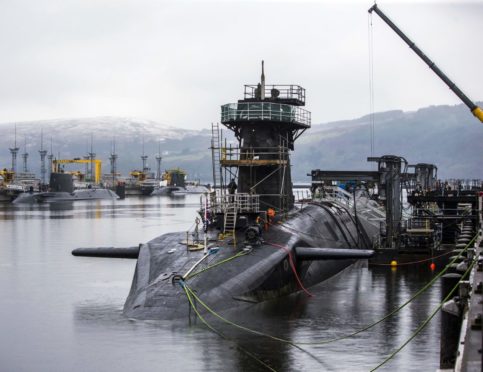
A consortium of private firms has been awarded a Ministry of Defence contract to train the Royal Navy at Faslane nuclear base prompting concern among politicians.
Fisher Training, led by Capita, has won the £1bn contract with the consortium including Raytheon UK, Elbit Systems UK, Fujitsu and a number of smaller British suppliers.
Under the 12-year contract, Capita will be responsible for upgrading the Navy’s shore-based training at 16 sites across the UK. The consortium will also train Royal Marines.
Critics have, however, pointed to Capita’s record with UK public sector contracts while the activities of arms firms Raytheon and Elbit Systems around the world have prompted concerns over human rights issues.
Capita has 45,000 staff in the UK, most of them involved in public contracts, including the London congestion charging zone and collecting the BBC licence fee. However, the company’s record has been questioned after a series of problems with multi-million-pound contracts funded by taxpayers.
It recently won a training contract with the Army and says the deal to modernise training with the Royal Navy would deliver “better qualified and more motivated and experienced personnel”.
The consortium will be responsible for all training courses, apprenticeships and equipment, with around 1,100 employees from the private firms working alongside Royal Navy staff.
Capita was criticised previously for failing to meet targets on Army recruitment and for a contract with NHS England described by MPs as a “shambles”.
Concerns have also been raised over US firm Raytheon, which has a factory in Fife, after it weapons were linked to alleged war crimes in Yemen. Meanwhile, campaigners claim Israeli firm Elbit Systems has been the target of successful disinvestment campaigns in Scandinavia.
The SNP’s Martin Docherty-Hughes, MP for West Dunbartonshire and a member of the Westminster defence committee, said: “Capita is a company which exists to deliver value to its shareholders. Their record in delivering value to the public is more questionable. The government should reconsider its relationship with the company.”
John Healey, Labour’s Shadow Defence Secretary, said: “UK Tory ministers are rewarding failure. Their Capita contract failed to make the promised savings and the Army remains 10% under strength, whilst Capita IT systems for the Royal Navy and Royal Air Force have also been beset with defects. The MoD can not outsource responsibility and must put an end to this repeated cycle of failure followed by fresh contacts. ”
Dr Eurig Scandrett, chair of the Scottish Palestine Solidarity Campaign, highlighted Elbit’s work with the Israeli security services. He added: “Elbit Systems’ contract for border surveillance drones has recently been dropped by the EU. Elbit has now joined up with Raytheon who produce weapons used in Gaza.”
Greens MSP Ross Greer said: “It’s hugely concerning but not remotely surprising the MoD continues to outsource contracts to such companies.” However, Ryan Ramsay, a former Royal Navy submarine commander who worked at Faslane, said: “It is an emotive subject, particularly when many believe the only people who can train military people are the military. The reality is different.
“There’s no reason you can’t train civilians, most likely ex-military anyway, in particular areas. Capita should be able to bring together best practice from different sectors.
“The Royal Navy is much smaller than it was – in the future there may be not enough people to do support operations as well as training. The challenge will be the transition.” The Ministry of Defence said: “As part of our work to modernise the Royal Navy, we are transforming the way we train personnel.”
Capita said: “We were awarded this contract following a highly competitive process. The award is a measure of the confidence and trust the Royal Navy and the Ministry of Defence have in our expertise.
“We look forward to working with our consortium to transform, modernise and create better outcomes for the training service.”
Raytheon and Elbit were asked for comment.

Enjoy the convenience of having The Sunday Post delivered as a digital ePaper straight to your smartphone, tablet or computer.
Subscribe for only £5.49 a month and enjoy all the benefits of the printed paper as a digital replica.
Subscribe